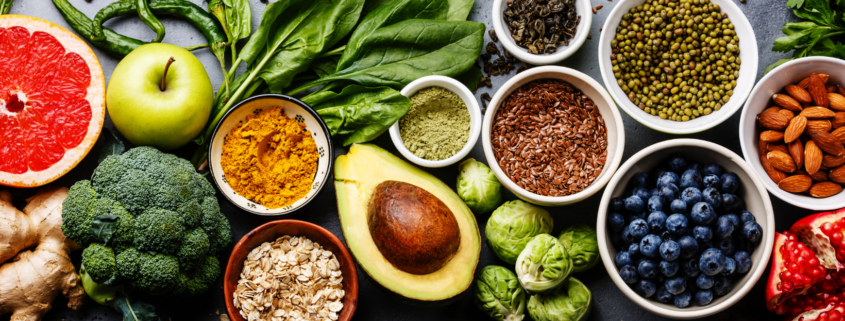Simple Ways to Support Your Immune System This Winter
As winter approaches, with colder weather and darker days, respiratory infections are on the increase. There are, however, some simple steps we can all take to help prevent infections or minimise symptoms and support quicker recovery if we do come down with something.
Maintain Adequate Levels of Vitamin C
Vitamin C is essential for optimal immune function. It’s necessary for growth and repair of body tissues as well as the production and proper function of important immune cells such as B-cells, T-cells and macrophages.
The human body doesn’t produce vitamin C, so it must be included in our diet to ensure sufficient levels are maintained.
For optimum levels of vitamin C through the winter months, it’s important to eat lots of food that are rich in this essential nutrient. These include:
- Broccoli
- Peppers
- Cabbage
- Cauliflower
- Lemons
- Oranges
Kate Delmar-Morgan, our Registered Nutritional Therapist rCNHC, MBANT, adds, “You need to provide your body with a constant supply of Vitamin C. Because it is a water-soluble vitamin, it doesn’t gets stored in the body so generally eating plenty of fruits and vegetables will help to support your levels of Vitamin C – aim for half a plate of these with each meal.”
Supplementation of vitamin C can also be a useful addition to your diet to help support the immune system.
High doses of vitamin C can make some medicines less effective so if you’re taking prescription medication, it’s best to check with your doctor or consult a Registered Nutritional Therapist before starting a programme of supplementation.
Supplement Vitamin D
Vitamin D is another essential vitamin for proper immune function. If a foreign pathogen is detected in the body, T-cells (the killer cells of the immune system) first search for vitamin D . Without sufficient vitamin D levels in the blood, these cells are unable to mobilise, remaining dormant and not able to activate into killer cells that are primed to eliminate the pathogen.
As well as some T-cells transforming into killer cells, other T-cells become helper cells following activation. Helper cells assist in the development of ‘memory’ so the immune system can recognise the pathogen and respond effectively if it’s encountered again.
Most Vitamin D is produced as a natural by-product of the skin’s exposure to sunlight over the summer months and is stored in the body. However, the levels of UVB light in the UK over the late autumn and winter months are not sufficient for the skin to produce optimal levels of vitamin D. This may be one of the reasons why we see an increase in infections during the winter.
There are foods rich in vitamin D such as oily fish and eggs, but it’s challenging to reach the levels required for optimum immune function over the winter months with diet alone. Further, vitamin D from food or supplementation is not usually in the form the immune system utilises. Vitamin D2 or D3 in supplement form needs to be converted into the available form of vitamin D in the body and this takes a little time. If you wait to increase your vitamin D levels when you already have an infection, it could be too late. Levels of vitamin D therefore need to be maintained in advance and to that end, supplementation during the winter can play an important role.
Optimise Zinc and Quercetin
Zinc is an essential mineral that has been shown to reduce the severity of symptoms associated with cold infection and possibly reduce the duration of an infection. Zinc deficiency is associated with immune system defects especially in relation to the development and function of B-cells.
Zinc is found in lots of foods, including:
- Meat
- Shellfish
- Legumes
- Nuts and seeds
- Dairy
- Eggs
- Wholegrains
- Some vegetables such as mushrooms and kale
- Dark chocolate
Quercetin, a plant flavonoid, is another very useful nutrient. It’s an antioxidant and among other helpful functions, it acts as a zinc shuttle – helping natural antiviral zinc enter the cells where it can mitigate viral replication. It’s a good idea to include quercetin-rich foods in your diet alongside good zinc intake. There are many foods rich in quercetin, including:
- Apples
- Berries and cherries
- Red onions
- Tomatoes
- Capers
- Broccoli
- Cabbage
- Kale
- Citrus fruits
- Peppers
- Almonds
- Asparagus
- Tea
Kate adds “Another way to support your immunity is by supporting your gut health since the gut is a major part of your immune system. You can do this by reducing the amount of sugar in your diet and eating fermented foods such as: kimchee, sauerkraut, miso and kefir.”
Minimise Stress & Nurture Yourself
When we’re chronically stressed or anxious, the body’s ability to fight foreign pathogens is reduced and we become more susceptible to infection. Long-term chronic stress can ravage the body’s immune system and so managing stress, especially long-term stress, is an important step to take in helping to fight possible infections.
Social connections have also been found to be immune boosting while social isolation inhibits immune function.
Finding ways to minimise exposure to stressors while maintaining positive social bonds keeps us both happier and healthier. Interventions that have been shown to help reduce stress levels and therefore support the immune system include:
- Sleep: Getting enough good quality sleep has been shown to support healthy immune function.
- Exercise: Exercise has been shown to help lower cortisol levels and lift mood so take a walk, go for a jog or join a Pilates or yoga class for some mindful exercise. Aim to incorporate some exercise every day to help maintain equilibrium. Kate adds “If you’re exercising in the evening try to do this early evening rather than late evening to avoid the risk of sleep disruption.”
- Meditation, mindfulness and breathing exercises: If meditation doesn’t come naturally, there are lots of great apps you can try. We recommend Headspace, Waking Up and Calm. You could also try a mindfulness course – find a course to attend locally in person or sign up for an online course such as The Experience, taught by local mindfulness teacher, Angus Ford-Robertson.
- Spending time with loved ones: Whether it’s with friends, family or groups of likeminded people, connecting with others is key to good health. Put down your phone or tablet, turn off the TV and make time to connect.
- Spend time in nature: Time in nature has been shown to be an antidote for stress. It lowers blood pressure, reduces stress hormones, balances the nervous system, reduces anxiety, improves mood and enhances immune function. Kate recommends Forest Bathing. Learn more at the Forest Bathing Institute
- Cognitive Behavioural Therapy, Psychological Therapy, Counselling, and other talking therapies: If you need more support, finding a qualified professional therapist can be an important step. Speak to your GP or insurance provider or, if you’re local to Balham, contact our dedicated mental wellbeing team for advice at wellbeing@recentre-health.co.uk or find a registered therapist in your area on the Counselling Directory
Further reading:
eRecipes – Immune Support – ANH International
http://www.uppitysciencechick.com/kiecolt-glaser_pni_jccp.pdf
https://e360.yale.edu/features/ecopsychology-how-immersion-in-nature-benefits-your-health















